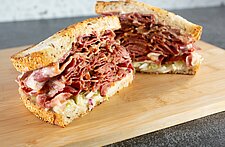Over the past decade or so, much attention has been focused on what makes Millennials unique. Yet as brands shift to meet the demand of younger consumers, such as for healthy, natural food, an even younger generation — Gen Z — has emerged as a powerful cohort.
In the past, food and beverage brands may have not been able to limit their attention to Gen Z, considering many were too young to make purchasing decisions. Now, however, the oldest in this group are getting their careers off the ground. And with each passing year, more enter the workforce and gain purchasing power.
In this four-part series of our Gen Z Initiative, we’ll explore:
1. What makes Gen Z unique?
2. What are Gen Z consumers like?
3. What food categories resonate with Gen Z?
4. What flavor trends stand out with Gen Z?
Don't miss the next articles in this series, subscribe to the Weekly In-sight Newsletter!
Food and beverage brands that understand and can appeal to Gen Z have a prime opportunity to grow their consumer base.
Defining Gen Z
The exact birth years of this generation can vary depending on who you ask, but generally, Gen Z includes those born in the mid-to-late ‘90s to around 2010. In other words, in 2020, Gen Zs are roughly 10-25 years old (though some definitions start at 1996, making 24 the oldest age). By some analyses, such as from Bloomberg, Gen Z may have already become the largest generation globally.
Given their birth years, Gen Zs were either too young to remember or born after the September 11, 2001, terrorist attacks. That means they’ve grown up in a very different world than Millennials regarding everything from airplane security to wars. Many Gen Zs also had their formative years shaped amidst global economic turmoil in the late 2000s/early 2010s.
Now, they’re experiencing a global pandemic, which has hit all generations in unique ways. In addition to the health risks for themselves and loved ones, the pandemic has had particularly large social and career effects for Gen Z. Recent college graduates, for example, may have had to pivot or put their job searches on pause. Others continue to attend school remotely, and even those who have returned to campus are usually not experiencing normal interactions with friends.
How Gen Z Stands Out
Aside from the global events around them, Gen Z stands out in many ways demographically and behaviorally. Gen Z is the most racially and ethnically diverse generation, according to the Pew Research Center. Nearly half are minorities, meaning they could be the last generation that’s majority Caucasian. Amidst this backdrop, Gen Z is considered to be an inclusive generation that wants equality for all.
Yet Gen Zs do not want to get caught up in labels. They embrace fluidity such as among gender, identity and sexuality. They also are considered to be “phigital,” meaning they live amidst blurred lines between the physical and digital worlds.
RELATED: Sustainable and Climate Friendly Food and Beverage Trends
Differentiating Gen Z from Millennials
While Gen Zs and Millennials share some similarities such as welcoming diversity, being health and environmentally conscious, and being digitally connected, there are clear differences amongst the generations.
For one, the fluidity that Gen Zs embrace extends to their careers. Millennials often have side hustles, but for Gen Z, having a multi-part career can be natural. For example, instead of being a writer who has some part-time passion projects, someone in Gen Z might consider themselves to be an author/podcaster/DJ.
In terms of being connected, many Millennials remember a time when the internet did not consume life. As such, many are mindful about trying to disconnect, whereas being connected is all that Gen Zs know. For many Gen Zs, all this digital connection can be stressful.
The good news though is that Gen Z often uses digital experiences in a positive way. They are passionate about social change and active about social issues online. Gen Zs are also creative. More than half say they are more creative than past generations, and 55% say online spaces are more creative than what’s offline, according to research from Sonar, as reported by PRmoment. And when Gen Zs do get offline, they’re still largely creative, such as by engaging in activities like drawing or playing an instrument.
Connecting With Gen Z
For brands, all this creativity, digital connection and a community built on acceptance and social progress open up opportunities to connect authentically. If food and beverage companies want Gen Zs as consumers, they need to be honest in their marketing, have a brand mission that supports areas such as equality or sustainability, and they need to tap into thecreative Gen Z spirit.
In the remaining installments of this series, we’ll dive deeper into how food and beverage brands can appeal to Gen Z. CLICK HERE to stay tuned with our Weekly Newsletter!
● Continue Reading: Part 2 — Gen Z as Consumers






